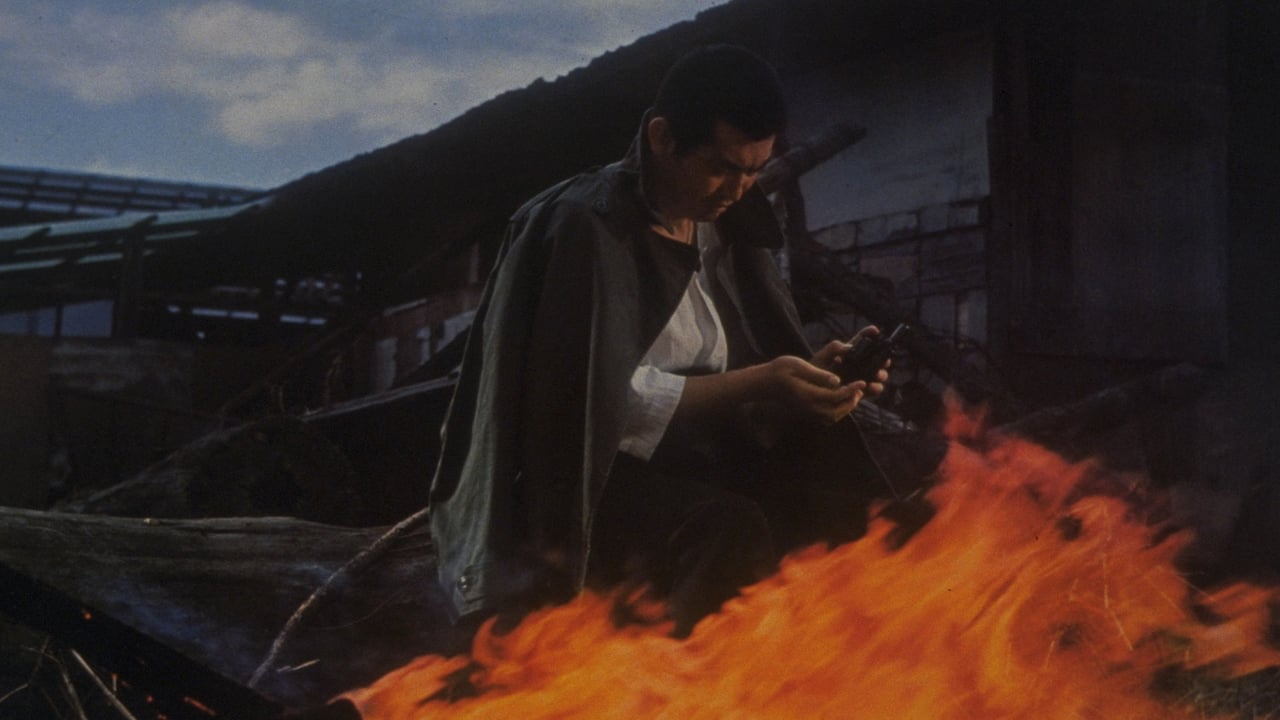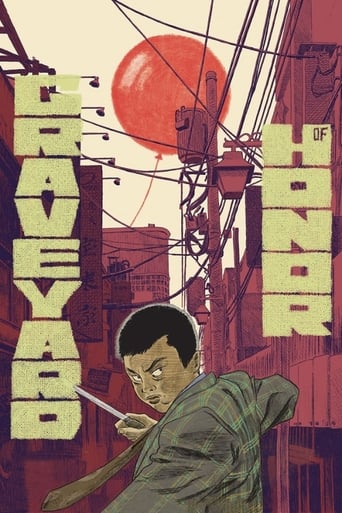



Boring
A very feeble attempt at affirmatie action
A different way of telling a story
When a movie has you begging for it to end not even half way through it's pure crap. We've all seen this movie and this characters millions of times, nothing new in it. Don't waste your time.
View MoreThe late Kninji Fukasaku is arguably most widely known for the more recent "Battle Royale" (2000), but the films that have earned him the deserved status as a true master of uncompromising cinema are arguably his gritty Yakuza films from the 70s. Such as the famous "Battles Without Honor And Humanity" films or this disturbing gem called "Jingi No Hakaba" aka. "Graveyard of Honor" (1975). Produced by the great Toei company "Graveyard of Honor" must be one of the most uncompromising and depressing Gangster portraits ever brought to screen, and it is also easily one of the most memorable Yakuza films I've seen. Unlike many other gangster films which somewhat glorify the Mafia, this is a a brutal, uncompromising utterly grim portrayal of organized crime and one criminal in particular. Set in Japan of the late 1940s, "Graveyard of Honor" tells the story of real-life Yakuza Rikio Ishikawa (I don't know how accurate it is, though) in a disturbing and highly memorable manner.Tokyo, 1946: thug Rikio Ishikawa (Tetsuya Watari) outshines all of the fellow members of his Shinjuku Yakuza family - in madness, brutality and irascibility. His spontaneous outbursts of violence are dreaded by both enemies and associates. When he increasingly begins to attack associates and even superiors, he becomes an outcast... Unlike many Gangster characters Ishikawa isn't really likable in any way. He is portrayed as a violent madman who rapes, brutalizes and murders apparently for no reason. However, in a way, one does feel sorry for him. Overall, this tough and seemingly soulless beast of a man who is feared by even his criminal peers, is also a pitiable creature unable to find any joy in life. Tetsuya Watari is brilliant in his role of the uncontrollably violent yet pitiable maniac criminal. The only truly likable character in the film is Ishikawa's girlfriend (played by the beautiful Yumi Takigawa), who sticks with Rikio, the man who has raped her and made her a prostitute. Her story is the doubtlessly most heart-breaking part of the film. The supporting cast includes many familiar faces for fans of Japanese cinema, including Eiji Go ("Tokyo Drifter", "The Executioner", etc.) and the beautiful Exploitation-Princess Reiko Ike ("Sex And Fury", "Female Yakuza Tale", "Criminal Woman: Killing Melody",...) of whom I'm a big fan. The film is brilliantly shot in a very unique style, and seems very realistic and authentic. The violence is brutal, blood and uncompromising as the film itself. Overall, "Graveyard of Honor" is a truly remarkable film that must not be missed. Takashi Miike made a remake in 2002, but although I am a (moderate) Miike-fan I doubt that it's anywhere near as good as this one. This brutal, disturbing, sad and often depressing portrait of a violent madman must be one of the most uncompromising crime films ever made and no lover of Japanese cinema can afford to miss it.
View MoreDon't be misled. GRAVEYARD OF HONOR is not your typical Japanese Yakuza film. This genre most often depicts a battle between Good and Evil, or at the very least, the awareness of this struggle. Kinji Fukasaku, director of GRAVEYARD OF HONOR, has created a portrait of a character who is not cognizant of a single redeemable quality. Tetsuya Watari plays Rikio Ishikawa who was a real figure within the Japanese underworld in the years immediately following WWII. This man was clearly psychotic and was not to be restrained or regulated either by the police or leaders within his Yakuza brotherhood. Fresh out of jail, and then banished for attacking his own clan leader, he is sent to Osaka where he acquires a heroin habit. And, all along this downward slide, it is nearly impossible to generate any sympathy whatsoever for this reprehensible character. Fukasaku seems to suggest that US occupying forces were in some ways complicit in the corruption of post WWII Japan. As the US attempted to bolster Japanese self rule, it allowed the Yakuza's fortunes to prosper in phony democratic elections. However, in no way does this allow the viewer to empathize with the sadistically violent outbursts of Rikio Ishikawa. Kinji Fukasaku has crafted a film in which we watch as a malevolent anti-hero voraciously embraces the forces of darkness without a backwards glance.
View MoreKinji Fukasaku's mid-70s faux-biopic of a sociopath Yakuza gangster in late-40s Japan is certainly an absorbing experience, even if it never quite manages to immerse the viewer entirely in the nihilism of the world in which Tetsuya Watari's Rikio Ishikawa exists. It's difficult really to determine whether Fukasaku is trying to attract or repulse us here and, for me, this is the film's main weakness. Ishikawa has no redeeming features: he's simply a crude, boorish rapist and murderer who invokes unexplainable loyalty in those around him. There is some amusement to be found in the bewilderment of Ishikawa's Yakuza superiors, who don't seem to know quite what to do with the loose cannon in their midst (presumably something in the Yakuza code prevents them from simply taking him into a back alley and shooting him like a dog) but, for all its kinetic energy and undeniable style Graveyard of Honour mostly fails to fascinate, and fascinate it must the way a caterpillar squirming on the end of a pin fascinates if it is to hold an audience who can feel little or no connection with its main character.Despite these criticisms, the film is never dull. Fukasaku is an unsurpassable director, completely confident of his skills, totally focused, and unafraid to adopt subjects and styles that must have seemed out of the ordinary at the time. It's to his credit that most of the techniques he uses in this film are still widely used today especially by US gangster flicks. Fukasaku fills the screen with people in this one, countless people, hundreds of them, conveying the raucous and claustrophobic overcrowding of a country recovering from a bruising war. And while attention to period detail is perhaps not this film's strong point, this shortcoming is overcome by good use of sepia tones to reinforce the sense of history.
View MoreGraveyard of Honor is a fantastic entry into the yakuza genre or, for that matter, the gangster genre in general. However, more so than many of its counterparts, it is an excellent Brechtian character study. Filmed in a "mockumentary" style, Graveyard of Honor breaks up its action and storytelling relatively often with bits of narration, setting the events of the film in their period context and transitioning over long gaps in time.A reviewer once equated this film to the "blacksploitation" films of the same period: this betrayed the reviewer's ignorance to the genre. The Japanese gangster film is far more presentational than its western counterparts. From the bright, red, paint-like blood to the strict characterizations and operatic emotions, Graveyard of Honor and other films like it are a sort of midway point between Kabuki theater and French nihilism. It is an intriguing genre, and one that internationally acclaimed director Kinji Fukasaku uses brilliantly to pose intriguing questions and point out crucial problems in the Japanese mindset of the time.To truly appreciate his 1970s yakuza films, it helps to have knowledge of the history leading up o that time from the end of World War II. Watching Graveyard of Honor on its own will certainly be an entertaining experience, but anyone perplexed or intrigued by the film should do research on other films of the period, their cultural context, and their societal implications. Fukasaku was a groundbreaking director, and it's a shame that his brilliance could be lost in the cultural gap.
View More